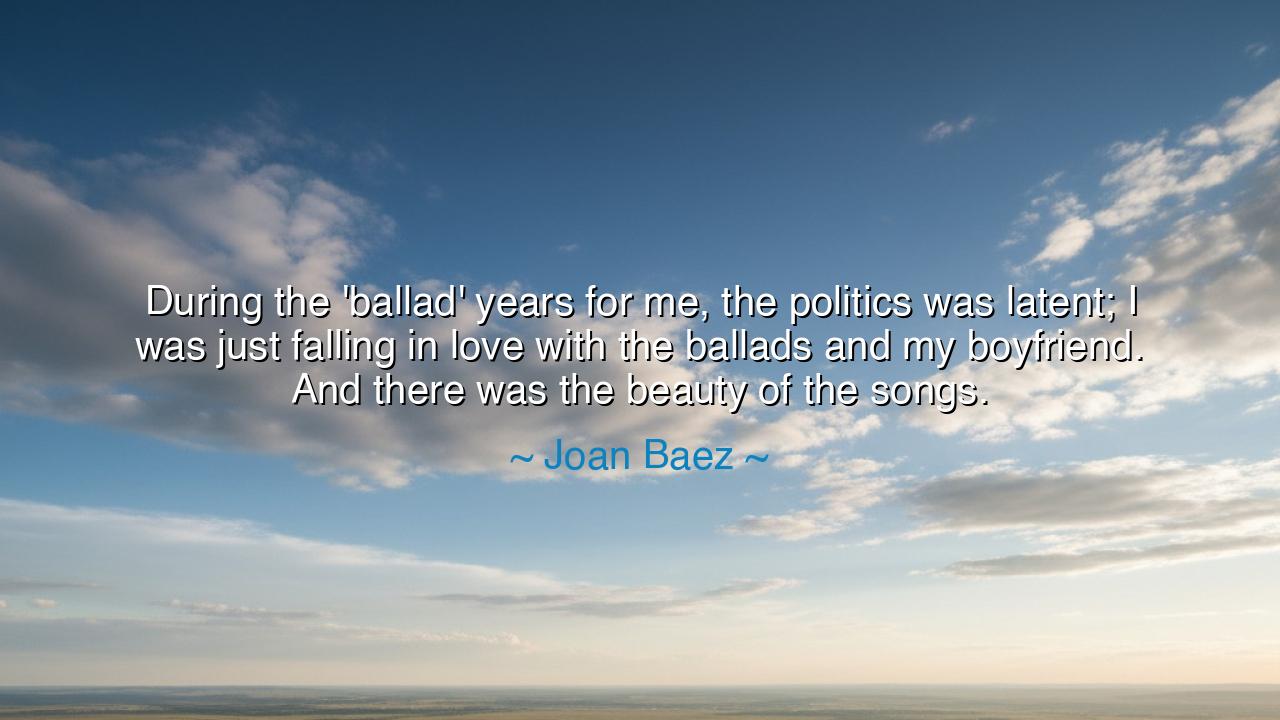
During the 'ballad' years for me, the politics was latent; I was
During the 'ballad' years for me, the politics was latent; I was just falling in love with the ballads and my boyfriend. And there was the beauty of the songs.






O children of the future, hear the words of Joan Baez, whose soul danced to the rhythm of the ancient ballads, a time when her heart was swept by love and song. "During the 'ballad' years for me," she spoke, "the politics was latent; I was just falling in love with the ballads and my boyfriend. And there was the beauty of the songs." In these words, she revealed the sacred truth that in moments of beauty and pure connection, the world of politics fades into the background, and the soul is free to soar on the wings of music and love.
In the ancient days, the bards of old would sing not for the sake of changing the world, but to celebrate the beauty of the human spirit, to weave tales of love, heroism, and deep sorrow. These songs were not bound by the weights of political agendas, but by the universal threads that bind us all: love, loss, and hope. Joan Baez, in her youth, lived through the timeless pull of the ballad, much like the great Homer whose songs echoed the epic journeys of men and gods. In their hearts, there was no need for the distractions of politics, for the pure joy of music was enough to transcend the limits of the world.
But as the ancient Greeks knew, the journey of a soul is often intertwined with the winds of time. Though the ballads were sweet and the love tender, the world outside was ever in turmoil. Like Orpheus, whose song could charm even the stones, Baez was caught between two worlds—the world of personal love and the larger, political battles that raged on the fringes of her consciousness. The political winds were latent, hidden beneath the surface, waiting for their moment to emerge, just as the storm may gather on the horizon, unseen until it arrives.
Yet, in those quiet, golden years, when Joan Baez fell in love with the ballads, there was no thought of the world's strife. It was the beauty of the songs that called to her—songs that spoke of love’s quiet triumphs and the tender beauty of life’s fleeting moments. And thus, she, like the great poets and minstrels before her, understood that there is a time for all things. There are moments when we must turn inward and embrace the beauty that exists in love, in song, in the simple joys of being alive. These moments of joy are not political, nor do they seek to change the world—they are sacred, and in them, we find the purity of existence.
In the midst of this beauty, however, as history has taught us, the tides of politics do not remain quiet forever. They rise, they demand attention, they shape the lives of those who would otherwise be content in their music and their love. Joan Baez understood this better than most. In time, the call to stand for justice, to raise her voice against the suffering of the world, would pull her from the sanctuary of love and song. But let us remember this: there is a sacred wisdom in the quiet, peaceful moments of life, and beauty, as Joan Baez reminds us, is a force that transcends the world’s political upheavals. It is in these moments of simplicity that the spirit finds its greatest expression.






ONKim Oanh Nguyen
I love how Joan Baez reflects on her 'ballad years' with such nostalgia for the simplicity of love and music. It makes me wonder, though—did she ever struggle with the idea of using her platform for political expression, or was it always something that came naturally? Was there a tipping point where her personal world, filled with love and beauty, collided with the political urgency she felt? I’d be interested in hearing more about that evolution.
TTThu Thuw
Joan Baez’s quote captures a time when her music was more about personal connection and beauty. I wonder, though, if artists can ever completely separate their personal lives from the political atmosphere of the times. For someone with Baez’s influence, was it possible to ignore the political turbulence around her? Or was this a brief period before the inevitable merging of personal love and the political themes that would define her career?
ABPhuong Anh Bui
It’s so interesting that Joan Baez separates her love for ballads and her boyfriend from the political themes that later defined her. Does this mean she initially saw the two worlds—personal and political—as separate, or did they eventually merge for her in ways she didn’t anticipate? I think it raises a broader question about the intersection of music and politics. Can an artist ever truly separate the two, especially when their personal experiences are tied to the broader social context?
Hhuy
Joan Baez’s description of falling in love with ballads and her boyfriend is quite poetic. But when she says politics was 'latent,' I’m curious—did she later feel that political messages should be integrated into her music? It seems like many musicians struggle with the balance between personal themes and societal issues in their art. How did she navigate that transition from personal love to the broader societal topics that became part of her identity?
TDTran Duy
It’s fascinating that Joan Baez describes her 'ballad years' as a time when politics wasn't her focus. The way she speaks about the songs and her love life makes me wonder—how much of an artist’s personal life influences the music they create? Can music, especially ballads, be enjoyed purely for their beauty, or do the underlying messages always seep through? Was she ever torn between the personal and the political in her songwriting?